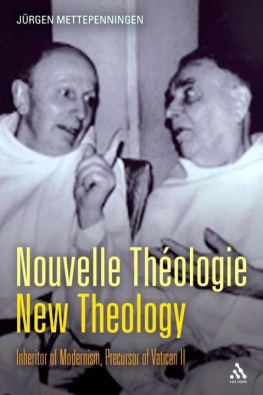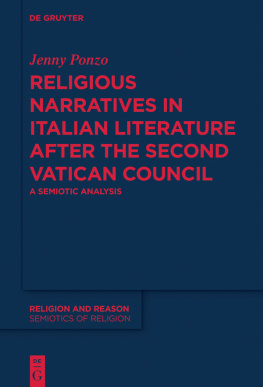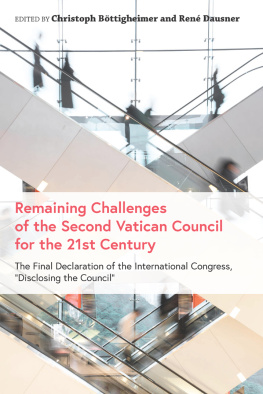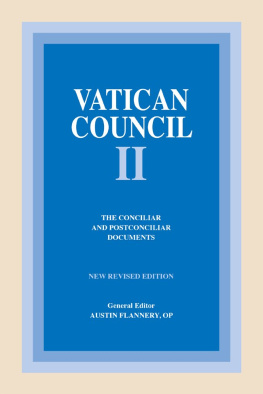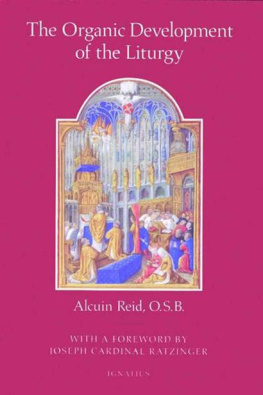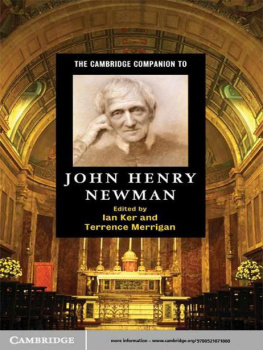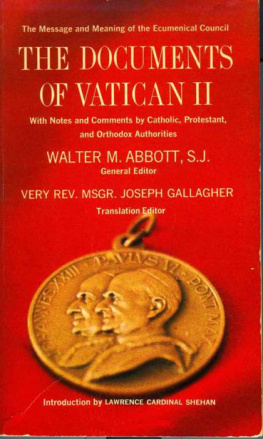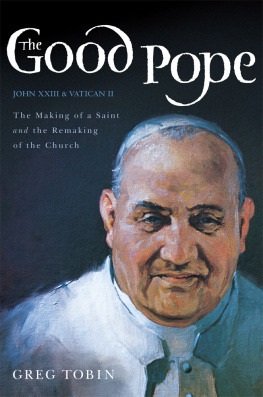Jurgen Mettepenningen


To my wife Els and our daughter Gloria

xi
xiii
PART I: CONCEPT, CONTENT, CONTEXT, CONTOURS
Chapter 1
Chapter 2
The Tubinger Schule
John Henry Newman
Ultramontanism, Neo-Scholasticism and Vatican I
The Modernist Crisis
The Internal Pluralization of Neo-Thomism
Theological Developments
Chapter 3
PART II: PHASES/FACES OF THE NOUVELLE THEOLOGIE PRIOR TO VATICAN II
Chapter 1
Yves Cougar
Two Articles, a Series and a Book Review
Nouvelle Theologie?
Marie-Dominique Chenu
Une ecole de theologie: le Saulchoir
Roman Condemnation and a Single Book Review
Nouvelle Theologie?
Henri-Marie Feret
A Project
Nouvelle Theologie?
Louis Charlier
An Essay
Reactions to the Essay
Roman Condemnation
Nouvelle Theologie?
Rene Dragnet
A Series of Articles
Nouvelle Theologie?
Jean-Francois Bonnefoy
Marie-Rosaire Gagnebet
Yves Cougar Revisited
Dominicus De Petter
Charles Boyer
Chapter 2
Henri Bouillard
The Conclusion to a Book
Nouvelle Theologie?
Jean Danielou
Two Articles
Nouvelle Theologie?
Henri de Lubac
Surnaturel
Nouvelle Theologie?
September 1946-January 1947
Entrenchment: February 1947
From the End of February 1947 to the End of 1948
Spring 1949-Summer 1951
Chapter 3
THE PHASE OF THE INTERNATIONALIZATION OF THE NOUVELLE THEOLOGIE.
Edward Schillebeeckx
Reception of the Nouvelle Theologie
Continued Evolution of the Nouvelle Theologie
Nouvelle Theologie?
Piet Schoonenberg
Reception of the Nouvelle Theologie
Continued Evolution of the Nouvelle Theologie
Nouvelle Theologie?
PART III: CLOSING CONSIDERATIONS
This book is the result of a great deal of work, a multitude of contacts, and above all an abundance of grace and opportunity.
I learned about the nouvelle theologie and its themes while preparing my doctoral dissertation on the debate that raged in the 1930s and 1940s in the French-speaking part of Western Europe on the nature and methods of theology. More particularly, in my dissertation I presented and commented on the contribution of the Dutch Jesuit Piet Schoonenberg and his own understanding and approach to the question. But my thirst for knowledge relating to the nouvelle theologie remained unsated and finally resulted in the present book, a work that moves beyond my dissertation yet continues to recognize its roots therein. For this reason, an initial word of gratitude is due to the promoter of my dissertation, Leo Kenis, who became an intellectual sparring partner in the process of guiding my dissertation, not in the least because he did not always share my vision with respect to the nouvelle theologie.
An academic is enriched by reading and sparring partners. The privilege of having an office in the Maurits Sabbe Library, the renowned library of the Faculty of Theology of the K.U.Leuven, ensured access to an almost endless supply of literature. My thanks are due, therefore, to the librarian Etienne D'hondt and the staff of the library for the countless treasures they preserve with enormous care. Thanks go as well to a number of archivists who were kind enough to permit me access to many different archives in France, Belgium and the Netherlands. In addition to being granted access to literature and archives, I was also granted access to the thoughts of a number of historians and theologians in many enriching conversations that provided the opportunity to put my own insights to the test: Hans Boersma (Vancouver), Erik Borgman (Tilburg), Leo Declerck (Louvain), Ward De Pril (Louvain), Anthony Dupont (Louvain), Etienne Fouilloux (Lyon), Wim Francois (Louvain), Lieve Gevers (Louvain), Marcel Gielis (Utrecht/Tilburg), Anthony Godzieba (Villanova), Gerd-Rainer Horn (Warwick), Leo Kenis (Louvain), Mathijs Lamberigts (Louvain), William L. Portier (Dayton), Michael Quisinsky (Geneva), Herwi Rikhof (Utrecht/ Tilburg) and Karim Schelkens (Louvain).
It is only possible to work efficiently in an agreeable and professional context. In addition to the members of the research unit of History of Church and Theology of the Louvain theological faculty, I would like to thank the group of scholars who participated in the research project `Orthodoxy: Process and Product' and its successor `The Normativity of History'. A special word of gratitude is due to the three professors who continue to give leadership to this interdisciplinary group: Lieven Boeve, Mathijs Lamberigts and Terrence Merrigan. Besides my Louvain colleagues, I would like to offer a special word of thanks to Jos Aelvoet, the director of the `Belgian House' at the Cite Internationale Universitaire de Paris in Paris, where I had the pleasure of staying from March to October 2009 while conducting research in a variety of archives.
Outside my professional framework, a great deal of thanks is due to my wife Els Vermeiren for the love, support and freedom she gave me to work on this book. She and our daughter Gloria are my most precious treasures. They know that their love is reciprocated.
Last but not least: this book would not have been possible were it not for the support of the `Research Foundation - Flanders' (my research framework), Brian Doyle (the translator), John Dick (the copy editor) and Thomas Kraft of Continuum/T&T Clark (the publisher). Many thanks!


What can possibly be new about theology? Such is the question that comes to mind when one reads the expression nouvelle theologie ('new theology'): the theological movement from the 1930s, 40s and 50s that was to set the tone for the Catholic theology of the Second Vatican Council, although it took a council to give the movement a positive connotation after three decades of magisterial rejection. Surprisingly enough, an age-old and venerable religious order stands at the basis of this nouvelle theologie. The contribution of several Dominicans was indeed innovative: before, during and after the Second World War, they called for a theology that was oriented towards the sources of the Christian faith and not (exclusively) towards a system based on scholasticism. In short, theology needed to restore its contact with the living reality of faith, and Dominicans such as Marie-Dominique Chenu, Yves Congar and Henri-Marie Feret were at the forefront of this appeal. In order to achieve this goal, theologians had to become aware of the urgent need to refresh theology's bonds with history, more specifically with the thought of Thomas Aquinas himself and not (only) with what others had made of it. To draw from the well of history is to return to the true sources of the faith and thereby transform the faith into the living object of theology.

